Strona główna > Warto poczytać > Teksty > Czy w Holandii jest tak różowo?
HF (2013-11-28)
Is the grass greener in the Netherlands?
The public debate, or rather a laid-back discussion, took place on 1 December at 16:30 in the Lublin's Fine Arts Association (Lubelskie Towarzystwo Zachęty Sztuk Pięknych). The guest speakers included: Arnhem's city council members: Gerben Karssenberg (Christian Party) and Sabine Andeweg (Liberal-Democratic Party); a representative of a anti-discrimination bureau in Arnhem: Janhendrik Krook; representatives of police force: Delianne van de Geest (Police Force from Gelderland Midden region) and Ellis Lesterade (Dutch National Police Academy), as well as representatives from the Dutch COC organization: Richard Gentenaar, Jeffrey Leuverman and Guus Bremer. The debate was moderated by Piotr Skrzypczak from the Homo Faber Association.
Piotr Skrzypczak made it clear at the beginning of the meeting that the goal of the debate is to disprove stereotypes. The title is provocative because whenever Poles talk about the Netherlands, we picture it as some sort of paradise. Some think that the Netherlands are free from discrimination, that the social services are good, the crime levels are low and that everybody has a job. it is often the case that people suffering from sexual discrimination move to the Netherlands in order to live a normal life and feel safe. On the other hand, we think about negative stereotypes, such as: on-call abortion and euthanasia or people doing “hard” drugs. And how the Dutch see us? "They drive too fast", "They are good and cheap construction workers", "They're religious", "They're homophobic" and "Poland is at war every half a century".
But what does it really look like? What's the true image of the Dutch society? What kinds of social problems do they encounter?
The Netherlands, just like other European countries, struggle with poor economy. As a result, the unemployment rate is quite high. Low salaries mean that people are forced to ask charities for help.
Does the society feel that the Polish immigrants have in any way contributed to the current situation? Do they think that the Polish immigrants have something to do with it?
Of course, some think that it's the immigrants who take their jobs, especially in the construction industry. Well-
educated Poles living in the Netherlands are also shocked, seeing their countrymen drinking and causing a ruckus. The majority doesn't have this mind-set however.
Will those Poles integrate?
People who spend their whole weeks on construction sites leave the cities on weekend. Social integration is more apparent among the well-educated Poles.
Does the Dutch government help with social integration of the immigrants?
A few months ago there was a lot of noise about job agencies which exploit Poles as a cheap workforce. The government enacted new rules to minimalize exploitation of workers. Agencies that guarantee high quality working conditions are awarded special certificates.In Poland there're talks about a Dutch political movement which tries to gain popularity by claiming that it's the immigrants who cast the country into a deeper economic crisis. There is Geert Wilders, a popular politician, the leader of the Party for Freedom. He encourages hate against immigrants in the local communities. I agree, it seems to be one of his main points. He proposed creating institutions where you could submit complaints concerning immigrants, Poles included.
As people working with those communities, how do you try to counter this phenomenon?
The most basic way is simply making the right choice once every four years - mainly not voting for them. In the previous elections, the Party for Freedom got 10 per cent of the votes. It was mainly because the previous government collapsed due to the bad economic situation in the country. In the recent elections they lost some support but we have to keep in mind that in the last few years they were a member of the coalition.
What steps are being taken by the local government?
The Members of the Party for Freedom mark certain social issues as problematic, for example, the issue of Muslim immigrants. Despite the fact that most Dutch people don't agree with them, the Party for Freedom successfully introduces the issue to the public. Another problem is that such misinformation reaches, for example, Poland, even though it's a voice of a minority in the Netherlands.This type of activities sometimes leads to scandals. Once, a movie about Muhammad was shown, in which the Koran was burnt and the prophet insulted. The only solution is to ignore such views. There's no other way - they are free to voice their own opinions. What should be done is making sure that they don't get elected.
What can you do to prevent them from getting elected?
We protest, we vote for other parties, and if they break the law, we sue them.
How can you persuade the voters not to vote for such parties? Do you conduct any social campaigns?
Before the elections, the COC organises political debates and asks the candidates about their stance on particular social issues.
Are people interested in such activities? Do they participate?
We had public elections in September. We organized such a debate beforehand. There were about a hundred guests, among them the leaders of the main political parties. They presented their parties' stances on LGBTQ issues. The debate was broadcasted on the national media, which increased its audience.
And if the media and the politicians are not present, are the citizens interested in social issues?
It is difficult for me to represent the views of 16 million Dutch people. Those issues are placed very high on the political agenda. Almost everyone attends the parade on "The Pink Saturday".Acts of aggression, like the recent attack on a Muslim woman, are criticised by the media and public opinion.
Do you vote for a party which has the best plans or do you simply pick the lesser evil?
In the Netherlands we have a lot to choose from. We don't have to pick the lesser evil; we can pick a party which we believe is the best. They have lots of different plans, also concerning ethical issues. Coming back to the issue of euthanasia, some parties are for, and some are against it.
Are those parties cynical? Do they actually realise their promises?
Parties often have to compromise as they don't work alone. They can't enact laws by themselves. The multi-party system requires the formation of coalition. A coalition is composed of parties who share the same stance on the key issues but still seek a compromise in others. Since 2001, the Netherlands allows same-sex marriages. Today, there are no more parties who'd wish to delegalize them. In 2001, three parties which held the majority of the seats in the parliament voted for it. The politicians did it out of their own volition. Back then, the Christian Party didn't support the notion of same-sex
marriage. Now, they don't want to revoke it. You just have to start at some point. Representation of different groups and organizations is also very important, as it can stay the same for many years. It works in a similar way as in the Netherlands and the issues worked on by the COC.
Which minorities are discriminated against the most? Does the police force keep track of it?
They don't, because there is only less than twenty cases of this type a year. Even so, the police are focused on dealing with the more "traditional" criminal activities. Dealing with discrimination is left to the specialised anti-discrimination bureau.
The anti-discrimination bureau keeps the most up-to-date statistics. The leading causes of discrimination are age, nationality and gender. The bureau gathers information in order to aid the creation of social equality. We hope to raise social awareness, to show that something like this exists. Another crucial element required to introduce the anti-discrimination policies is discussion, which should take place on all levels - with politicians, between neighbours, in families and also in schools. Poland should accept same-sex relationships and be prepared for the potential resistance, which is a natural follow-up of radical changes. Homosexual people should start coming out and support each other against the resistance of society, which always takes place at start.
What do Poles think about legalizing same-sex marriage in Poland?
According to Poles attending the debate, in Poland there never is an agreement in any social issue. Even during such holidays as the Independence Day there are three separate parades. In the Netherlands there's common agreement on the issue of respecting human rights. Some people in Poland are in favour of death penalty and torture. Equality is thought about in a more egoistical manner, rather than something that benefits the whole society. We can't agree even on those basic ideas. On the other hand, there are not as many violent attacks here as in the Netherlands. First of all, it requires changes to the law. Apart from that we need to develop political will. It might take even as long as the COC’s activity period (50-60 years). It is necessary. Emigration of displeased citizens is not and cannot be a long-term solution.
Let's talk about equality. - Porozmawiajmy o równości.
The public debate was the conclusion of a series of meetings that took place in Lublin between 29th November and 1st December 2012. The speakers, including city officials, education workers and non-governmental institutions, discussed if Lublin is ready to introduce anti-discrimination policies. Would the plan used in the Netherlands work here as well? Which of our experiences the Dutch could use in Arnhem? In the course of those three days, we didn't get a conclusive answer. However, it was the beginning of the debate about equality. But we did agree on one thing - it doesn't require changing your government or religion. You just have to believe that such social dialogue is possible and necessary.
The meeting was hosted by the Homo Faber association and COC (the Netherlands), in cooperation with the Lublin's Mayor's Office and the UMCS Political Science Institute's Human Rights Organization. The debate is sponsored by the Lublin Voivoidship's Marshal.
Komentarze
HF (2013-11-28)
Is the grass greener in the Netherlands?
The public debate, or rather a laid-back discussion, took place on 1 December at 16:30 in the Lublin's Fine Arts Association (Lubelskie Towarzystwo Zachęty Sztuk Pięknych). The guest speakers included: Arnhem's city council members: Gerben Karssenberg (Christian Party) and Sabine Andeweg (Liberal-Democratic Party); a representative of a anti-discrimination bureau in Arnhem: Janhendrik Krook; representatives of police force: Delianne van de Geest (Police Force from Gelderland Midden region) and Ellis Lesterade (Dutch National Police Academy), as well as representatives from the Dutch COC organization: Richard Gentenaar, Jeffrey Leuverman and Guus Bremer. The debate was moderated by Piotr Skrzypczak from the Homo Faber Association.
Piotr Skrzypczak made it clear at the beginning of the meeting that the goal of the debate is to disprove stereotypes. The title is provocative because whenever Poles talk about the Netherlands, we picture it as some sort of paradise. Some think that the Netherlands are free from discrimination, that the social services are good, the crime levels are low and that everybody has a job. it is often the case that people suffering from sexual discrimination move to the Netherlands in order to live a normal life and feel safe. On the other hand, we think about negative stereotypes, such as: on-call abortion and euthanasia or people doing “hard” drugs. And how the Dutch see us? "They drive too fast", "They are good and cheap construction workers", "They're religious", "They're homophobic" and "Poland is at war every half a century".
But what does it really look like? What's the true image of the Dutch society? What kinds of social problems do they encounter?
The Netherlands, just like other European countries, struggle with poor economy. As a result, the unemployment rate is quite high. Low salaries mean that people are forced to ask charities for help.
Does the society feel that the Polish immigrants have in any way contributed to the current situation? Do they think that the Polish immigrants have something to do with it?
Of course, some think that it's the immigrants who take their jobs, especially in the construction industry. Well-
educated Poles living in the Netherlands are also shocked, seeing their countrymen drinking and causing a ruckus. The majority doesn't have this mind-set however.
Will those Poles integrate?
People who spend their whole weeks on construction sites leave the cities on weekend. Social integration is more apparent among the well-educated Poles.
Does the Dutch government help with social integration of the immigrants?
A few months ago there was a lot of noise about job agencies which exploit Poles as a cheap workforce. The government enacted new rules to minimalize exploitation of workers. Agencies that guarantee high quality working conditions are awarded special certificates.In Poland there're talks about a Dutch political movement which tries to gain popularity by claiming that it's the immigrants who cast the country into a deeper economic crisis. There is Geert Wilders, a popular politician, the leader of the Party for Freedom. He encourages hate against immigrants in the local communities. I agree, it seems to be one of his main points. He proposed creating institutions where you could submit complaints concerning immigrants, Poles included.
As people working with those communities, how do you try to counter this phenomenon?
The most basic way is simply making the right choice once every four years - mainly not voting for them. In the previous elections, the Party for Freedom got 10 per cent of the votes. It was mainly because the previous government collapsed due to the bad economic situation in the country. In the recent elections they lost some support but we have to keep in mind that in the last few years they were a member of the coalition.
What steps are being taken by the local government?
The Members of the Party for Freedom mark certain social issues as problematic, for example, the issue of Muslim immigrants. Despite the fact that most Dutch people don't agree with them, the Party for Freedom successfully introduces the issue to the public. Another problem is that such misinformation reaches, for example, Poland, even though it's a voice of a minority in the Netherlands.This type of activities sometimes leads to scandals. Once, a movie about Muhammad was shown, in which the Koran was burnt and the prophet insulted. The only solution is to ignore such views. There's no other way - they are free to voice their own opinions. What should be done is making sure that they don't get elected.
What can you do to prevent them from getting elected?
We protest, we vote for other parties, and if they break the law, we sue them.
How can you persuade the voters not to vote for such parties? Do you conduct any social campaigns?
Before the elections, the COC organises political debates and asks the candidates about their stance on particular social issues.
Are people interested in such activities? Do they participate?
We had public elections in September. We organized such a debate beforehand. There were about a hundred guests, among them the leaders of the main political parties. They presented their parties' stances on LGBTQ issues. The debate was broadcasted on the national media, which increased its audience.
And if the media and the politicians are not present, are the citizens interested in social issues?
It is difficult for me to represent the views of 16 million Dutch people. Those issues are placed very high on the political agenda. Almost everyone attends the parade on "The Pink Saturday".Acts of aggression, like the recent attack on a Muslim woman, are criticised by the media and public opinion.
Do you vote for a party which has the best plans or do you simply pick the lesser evil?
In the Netherlands we have a lot to choose from. We don't have to pick the lesser evil; we can pick a party which we believe is the best. They have lots of different plans, also concerning ethical issues. Coming back to the issue of euthanasia, some parties are for, and some are against it.
Are those parties cynical? Do they actually realise their promises?
Parties often have to compromise as they don't work alone. They can't enact laws by themselves. The multi-party system requires the formation of coalition. A coalition is composed of parties who share the same stance on the key issues but still seek a compromise in others. Since 2001, the Netherlands allows same-sex marriages. Today, there are no more parties who'd wish to delegalize them. In 2001, three parties which held the majority of the seats in the parliament voted for it. The politicians did it out of their own volition. Back then, the Christian Party didn't support the notion of same-sex
marriage. Now, they don't want to revoke it. You just have to start at some point. Representation of different groups and organizations is also very important, as it can stay the same for many years. It works in a similar way as in the Netherlands and the issues worked on by the COC.
Which minorities are discriminated against the most? Does the police force keep track of it?
They don't, because there is only less than twenty cases of this type a year. Even so, the police are focused on dealing with the more "traditional" criminal activities. Dealing with discrimination is left to the specialised anti-discrimination bureau.
The anti-discrimination bureau keeps the most up-to-date statistics. The leading causes of discrimination are age, nationality and gender. The bureau gathers information in order to aid the creation of social equality. We hope to raise social awareness, to show that something like this exists. Another crucial element required to introduce the anti-discrimination policies is discussion, which should take place on all levels - with politicians, between neighbours, in families and also in schools. Poland should accept same-sex relationships and be prepared for the potential resistance, which is a natural follow-up of radical changes. Homosexual people should start coming out and support each other against the resistance of society, which always takes place at start.
What do Poles think about legalizing same-sex marriage in Poland?
According to Poles attending the debate, in Poland there never is an agreement in any social issue. Even during such holidays as the Independence Day there are three separate parades. In the Netherlands there's common agreement on the issue of respecting human rights. Some people in Poland are in favour of death penalty and torture. Equality is thought about in a more egoistical manner, rather than something that benefits the whole society. We can't agree even on those basic ideas. On the other hand, there are not as many violent attacks here as in the Netherlands. First of all, it requires changes to the law. Apart from that we need to develop political will. It might take even as long as the COC’s activity period (50-60 years). It is necessary. Emigration of displeased citizens is not and cannot be a long-term solution.
Let's talk about equality. - Porozmawiajmy o równości.
The public debate was the conclusion of a series of meetings that took place in Lublin between 29th November and 1st December 2012. The speakers, including city officials, education workers and non-governmental institutions, discussed if Lublin is ready to introduce anti-discrimination policies. Would the plan used in the Netherlands work here as well? Which of our experiences the Dutch could use in Arnhem? In the course of those three days, we didn't get a conclusive answer. However, it was the beginning of the debate about equality. But we did agree on one thing - it doesn't require changing your government or religion. You just have to believe that such social dialogue is possible and necessary.
The meeting was hosted by the Homo Faber association and COC (the Netherlands), in cooperation with the Lublin's Mayor's Office and the UMCS Political Science Institute's Human Rights Organization. The debate is sponsored by the Lublin Voivoidship's Marshal.
Komentarze
- Brak komentarzy






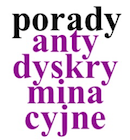

 Jeśli chcesz być informowany/a na bieżąco o wydarzeniach prosto z Homo Faber, zapisz się do naszego newslettera.
Jeśli chcesz być informowany/a na bieżąco o wydarzeniach prosto z Homo Faber, zapisz się do naszego newslettera.




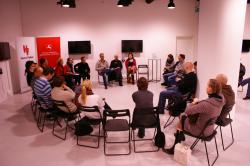
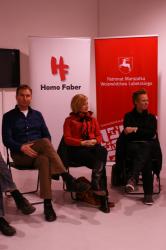
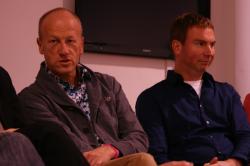
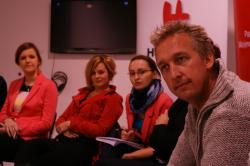

 Portal na którym w tej chwili znajdujesz się został wykonany dzięki dotacji Unii Europejskiej - Środki Przejściowe 2005 (TF2005/017-488.01.01.01) - w ramach projektu Akademia Obywatelska IV realizowanego w roku 2008. Portal, Akademia HF oraz pismo Opornik są jego kontynuacją.
Portal na którym w tej chwili znajdujesz się został wykonany dzięki dotacji Unii Europejskiej - Środki Przejściowe 2005 (TF2005/017-488.01.01.01) - w ramach projektu Akademia Obywatelska IV realizowanego w roku 2008. Portal, Akademia HF oraz pismo Opornik są jego kontynuacją.